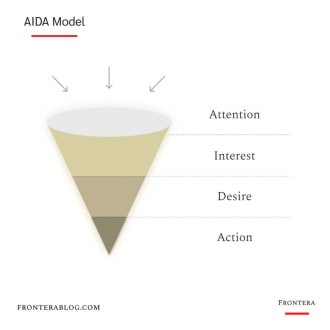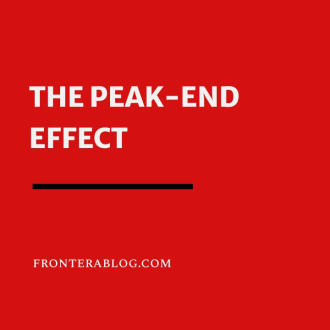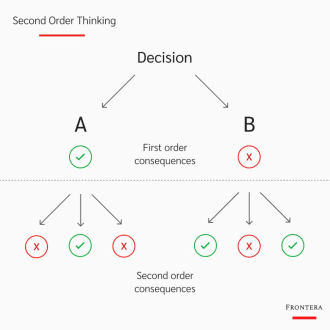The Best of Frontera ♦️
10+ most popular Frontera ♦️ articles, as voted by our community.
Frontera ♦️ on Better Living
Uncertainty Matrix: How To Deal With Uncertainty (And Gain From It)
There are four degrees of uncertainty. And knowing them can give you an edge in business and life. Here's how to use the Uncertainty Matrix.
«Research shows uncertainty is even more stressful than knowing a bad outcome.»
Frontera ♦️ on Business
Framestorming: How A Simple Focus Shift Saved T-Mobile (And How To Do The Same):
How T-Mobile beat giants in their own game, how Zara changed fashion, and how to use Framestorming to find the right focus for your brand:
Circle Of Competence: How To Increase Your Odds Of Winning in Business
Why Hooters Air failed, why Bloomberg Media succeeded, and how to increase your chances of winning in business with your circle of competence:
«General Electric’s famous CEO Jack Welsh said it well: “If you don’t have a competitive advantage, don’t compete.”»
Frontera ♦️ on Competition
Blue Ocean Strategy: How To Make Your Competition Irrelevant
In 2001, Yellow Tail entered the competitive US wine market. And they managed to dominate it. Here's how to use the Blue Ocean Strategy:
Frontera ♦️ on Marketing
How To Think In Funnels (And Achieve The Best Possible Outcomes)
Elias Elmo Lewis created a formula that changed marketing forever. But his method applies beyond marketing. Here's how to think in funnels:
Double Diamond Model: How Ogilvy Made Dove Great Again
How Ogilvy made Dove great. And how his disciples made Dove great again 50 years later. Plus, how to do the same with Double Diamond:
«Like any experienced advertising agency, they didn’t immediately start working on a solution based on assumptions.»
Frontera ♦️ on Mental Models
Salience Bias: How to Become Unforgettable
Patagonia told customers “Don’t buy this jacket.” and increased sales by 30%. Here's how they used salience bias and how you can do the same.
«Because when we pay more attention to what’s noticeable —whether an object, trait, or event— we ignore less prominent but more relevant ones.»
Frontera ♦️ on Psychology
The Priming Effect: How Expectations Become Reality
Can higher expectations actually create better outcomes? Here's what the priming effect is and how to use it to your benefit in business:
The Peak-End Effect: How To Make a Lasting Impression (Even After Failures)
In 2018, KFC ran out of chicken in the UK. But they managed to save their public image. Here's how to use the peak-end effect in business:
«The peak-end effect has a strong influence on our memories — hence future decisions.»
Frontera ♦️ on Thinking
The Law of Diminishing Returns: How To Do More With Less
After a certain point, increasing one input reduces efficiency. Here's how you can use the law of diminishing returns to do more with less:
«Identify the core 20% activities that will give 80% of the results in each area of your business (and life).»
Popular
These are some all-time favorites with Refind users.
Life-Changing Concepts Newsletter
Life-Changing Concepts: A weekly newsletter with stories, mental models, and ideas to make you more successful in life. Join 1000+ readers.
Mimetic Desires: Why We Copy Others (And Why It Matters)
Mimetic desires drive human behavior. And at scale, it forms cultures around the same ambitions. Here's how to use it to your benefit.
Value Tradeoffs: How To Increase Your Brand’s Perceived Value (Without Doing Anything New)
Ryanair started roasting its customers on social media. And their sales grew. Here's why it worked and how to value tradeoffs for your brand:
Thinking in Bets: How to Make Decisions Like a Poker Player
Thinking in bets is a decision-making framework developed by former professional poker player Annie Duke. It allows you to take luck into consideration.
Brand Dilution: How Strong Brands Lose Their Power (And How To Avoid It)
How Marlboro risked its growth with light cigarettes, why Rolex created Tudor, and how to avoid brand dilution:
What is Refind?
Every day Refind picks the most relevant links from around the web for you. is one of more than 10k sources we monitor.
How does Refind curate?
It’s a mix of human and algorithmic curation, following a number of steps:
- We monitor 10k+ sources and 1k+ thought leaders on hundreds of topics—publications, blogs, news sites, newsletters, Substack, Medium, Twitter, etc.
- In addition, our users save links from around the web using our Save buttons and our extensions.
- Our algorithm processes 100k+ new links every day and uses external signals to find the most relevant ones, focusing on timeless pieces.
- Our community of active users gets the most relevant links every day, tailored to their interests. They provide feedback via implicit and explicit signals: open, read, listen, share, mark as read, read later, «More/less like this», etc.
- Our algorithm uses these internal signals to refine the selection.
- In addition, we have expert curators who manually curate niche topics.
The result: lists of the best and most useful articles on hundreds of topics.
How does Refind detect «timeless» pieces?
We focus on pieces with long shelf-lives—not news. We determine «timelessness» via a number of metrics, for example, the consumption pattern of links over time.
How many sources does Refind monitor?
We monitor 10k+ content sources on hundreds of topics—publications, blogs, news sites, newsletters, Substack, Medium, Twitter, etc.
Can I submit a link?
Indirectly, by using Refind and saving links from outside (e.g., via our extensions).
How can I report a problem?
When you’re logged-in, you can flag any link via the «More» (...) menu. You can also report problems via email to hello@refind.com
Who uses Refind?
450k+ smart people start their day with Refind. To learn something new. To get inspired. To move forward. Our apps have a 4.9/5 rating.
Is Refind free?
Yes, it’s free!
How can I sign up?
Head over to our homepage and sign up by email or with your Twitter or Google account.














